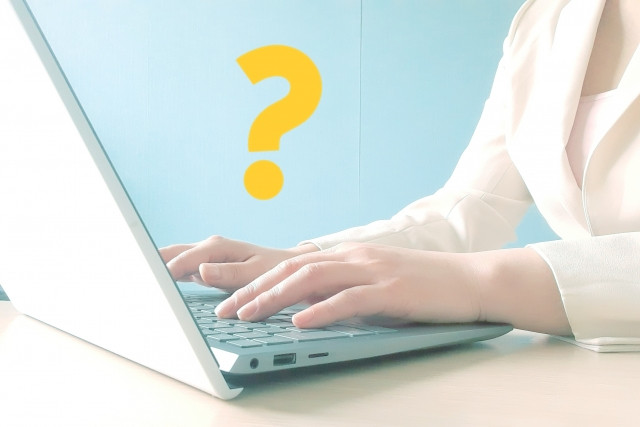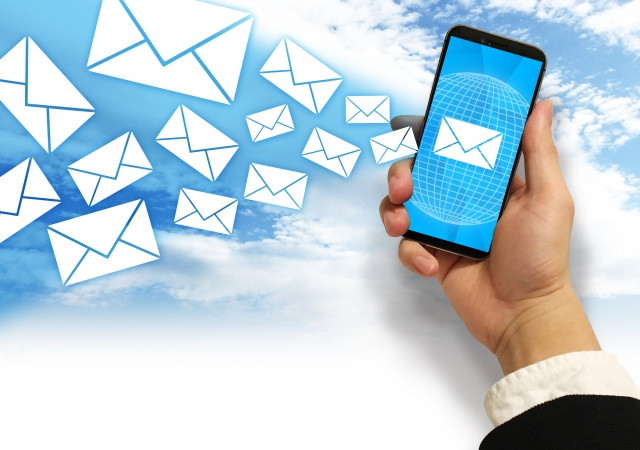There are many rules when it comes to writing Japanese emails making it difficult for first-timers. In this article, we teach you how to write a Japanese email in the correct format and etiquette.
Table of Contents
- Why are Japanese emails so hard to write?
- How to Write Japanese Emails
- Example Japanese Emails for Different Situations
- Important Things to Keep in Mind When Sending Emails
- Find a Job in Japan with WeXpats
 Are you having any issues with job-hunting in Japan?
Are you having any issues with job-hunting in Japan?
Why are Japanese emails so hard to write?

Japanese emails are difficult to write. This is because there are many detailed rules to follow and they contain expressions that are not used in daily life.
Fixed Detailed Rules When Writing Japanese Emails
Japanese letters always start with salutations such as “拝啓 (Haike)” or “啓上 (Keijou)”, followed by a seasonal greeting. When ending the letter, you must include a closing greeting to wish for the recipient’s success and good health, and a closing phrase such as “敬具 (Keigu)” or “かしこ (Kashiko)” meaning. There are many other points to consider such as indentation after the first letter is written etc..
The rules for writing a Japanese email are simpler. You need not mind the small details when communicating with someone of the same level as you. However, be very careful when writing business and workplace emails, i.e. to your boss or client. If you don’t adhere to the correct rules and etiquette, it will negatively affect your evaluation and give off a bad impression.
Japanese Emails Contain Not Commonly Used Expressions
Japanese business emails contain phrases and words that are not commonly used. Because it is not a face-to-face conversation, more respect and politeness is conveyed than in a face-to-face conversation.
For example, when speaking to a business contact you have regular dealings with, it is common to say “いつもお世話になっております (Itsumo osewa ni natte orimasu)”. However, in business emails, you would write, “平素よりお世話になっております (Heiso yori osewa ni natte orimasu.)”.
Also, when referring to the other person’s company, we say “御社 (Onsha)” in conversation, but in business emails you must change this to write “貴社 (Kisha)”.
Writer's Pick
How to Write Japanese Emails

An important point when writing Japanese emails is to make it easy for the recipient to understand while giving off a polite impression.

Email Subject: Make it Clear What The Email is About
In the subject line of your email, include specific and concise wording that makes it clear what the email is about. This will allow you to convey the content of the email even if the person does not read it because they are too busy.
Below are examples of email subject lines that convey the important parts of the email. The recipient can clearly understand what the email is in regards to. Furthermore, it shows consideration on the sender’s part.
- 「打ち合わせ日程のご相談【自分の所属している企業名・氏名】」
- 「●月●日の15時から伺います/自分の所属している企業名・氏名」
Using【 】etc. brackets make it look neat and easy to read. Avoid using “?” or “!” punctuation marks in business emails as they give off a casual impression.
Email Recipient: Write Who the Email is Intended For
When writing business emails to someone from the same company, always add “様 (-sama)” after “Department・Name”. If the person holds a position in the company, you can add their title after “Department・Name” instead.
When writing emails to someone outside the company, add “様 (-sama)” after “Company・Department・Name”. The company name should not be abbreviated, write it in full as such, “株式会社△△” or “有限会社●●”. “株式会社” and “有限会社” may come before or after the company name, so make sure to check the company’s official name.
When writing to organisations, ff you want everyone to check the email, address the email to “各位 (Kakui)”.If you only want specific persons to check the email, then address it to “関係者各位 (Kankeisha Kakui / To all concerned parties” or “●●部各位 (-bu Kakui / To everyone in the ●●department)”. Alternatively when addressing an entire department, you can also add “御中” after the department’s name.
Whether internal or external, if you do not know the recipient’s name, then write “ご担当者様 (Go-tantousha-sama / To whom it may concern)”.
Email Greetings: Start Off with a Greeting
Japanese emails do not jump straight into the main subject but rather start with a greeting. It is considered good manners in Japan to start a letter with a greeting, and this custom extends to emails as well. A seasonal greeting is not necessary, business email greetings are usually as follows:
- 「初めてご連絡いたします。△△と申します」
- 「ご無沙汰しております。△△です」
- 「お忙しいところ失礼いたします。△△社△△課の△△です」
You can also use the previously mentioned “平素よりお世話になっております”.
Email Content: Keep it Neat and Concise
For the main content, start with a brief introduction of what the email is about before writing the main content. Keep each sentence to 20~30 characters for easy reading, and start a new paragraph when changing topics. If many issues are covered, then use numbering or bullet points to make it neat and easy to read.
In business emails, the content should be clearly conveyed and casual topics are prohibited.
Email Closing: A Closing Greeting
A closing greeting must be included at the end of the email. This as the same function as "Best Regards" in English.
- 「どうぞよろしくお願いいたします」
- 「何卒よろしくお願い申し上げます」
- 「ご多忙と存じますが、くれぐれもご自愛ください」
If your email includes explanations, you can close with “ご不明な点がございましたら、お気軽にお尋ねください」と書いても良いでしょう。”.
Email Closing: Sender Information
Make sure to include your information at the end of the e-mail. For personal emails, include your name, and if necessary contact number and address. For internal company emails, include your name, department, and position. For external business emails, include the company name, address, and contact information.
Use dashes to separate this part from the main text of the email, like so.
何卒、よろしくお願い致します。 (Closing Greeting)
ーーーーーーーーーーーーーーーーーー
△△株式会社△△部△△課
△△ △△(氏名)
〒△△△ー△△△△
東京都品川区大崎△△△ー△△△△
電話番号:03ー△△△ー△△△△
携帯電話番号:△△△ー△△△△ー△△△△
メールアドレス:△△△△@△△.jp
ーーーーーーーーーーーーーーーーーー
Creating a template in advance will make things more convenient.
Example Japanese Emails for Different Situations

In this part, we will share some example Japanese emails based on different situations. Though the content is different, the format is pretty much the same.
Email for Hotel Reservation
When making a hotel reservation, write your name, desired dates of stay, number of people, plan, etc. in the email.
ーーーーーーーーーーーーーーーーーーーーーーーーーーーーー
件名:●●月●●日の予約【△△(自分の氏名)】
ーーーーーーーーーーーーーーーーーーーーーーーーーーーーー
●●ホテル
ご担当者様
●●ホテルの予約をお願いしたくメールをしております、△△(自分の氏名)と申します。
以下の日程や条件での予約は可能でしょうか。
氏名:△△
日にち:●●月●●日~●●月●●日
人数:大人●●人、子ども●●人
チェックイン予定時間:●●時
希望するプラン:●●プラン
希望する部屋:海側の部屋
携帯電話番号:△△△ー△△△△ー△△△△
メールアドレス:△△△△@△△.jp
お忙しいところ恐縮ですが、ご返信よろしくお願いいたします。
ーーーーーーーーーーーーーーーーーー
△△ △△(氏名)
〒△△△ー△△△△
東京都品川区大崎△△△ー△△△△
電話番号:03ー△△△ー△△△△
携帯電話番号:△△△ー△△△△ー△△△△
メールアドレス:△△△△@△△.jp
ーーーーーーーーーーーーーーーーーー
If you have any requests to the hotel, such as meal preferences or pick-up from the nearest station, please write them down as well.
Business Email to Request Something
When making a request through email, make sure to write the details of the request. Use polite expressions such as “Please (お願いいたします)” or “I would appreciate if you could do so (〜していただければ幸いです)”.
Below is an example business email when contacting a company asking for a first-time quotation.
ーーーーーーーーーーーーーーーーーーーーーーーーーーーーー
件名:●●見積書作成のお願い【△△株式会社△△(自分の氏名)】
ーーーーーーーーーーーーーーーーーーーーーーーーーーーーー
●●株式会社●●部●●課
ご担当者様
初めてご連絡させていただきます
△△株式会社△△部の△△(自分の氏名)と申します。
現在、弊社では貴社サービス●●の導入を検討しております。
つきましては、以下の内容にて見積書を作成していただけませんでしょうか。
商品名:●●
数量:●●
仕様:●●
納期:●●
なお、△月△日までにお見積書をいただけると幸いです。
何卒、よろしくお願いいたします。
ーーーーーーーーーーーーーーーーーー
△△株式会社△△部△△課
△△ △△(氏名)
〒△△△ー△△△△
東京都品川区大崎△△△ー△△△△
電話番号:03ー△△△ー△△△△
携帯電話番号:△△△ー△△△△ー△△△△
メールアドレス:△△△△@△△.jp
ーーーーーーーーーーーーーーーーーー
Although the expressions ”お願いします” and “〜してください” are considered polite, they may come off as too assertive and so should be avoided.
Business Email to Make an Appointment
When making an appointment, if possible, include several date and time options in your email.
ーーーーーーーーーーーーーーーーーーーーーーーーーーーー
件名:訪問日程のお伺い【△△株式会社△△(自分の氏名)】
ーーーーーーーーーーーーーーーーーーーーーーーーーーーー
●●株式会社●●部●●課
●●(相手の苗字)様
平素よりお世話になっております。
△△株式会社の△△(自分の氏名)です。
先日は、弊社サービス導入ご検討の連絡ありがとうございました。
つきましては、さっそく弊社サービスについて説明させて頂きたいと考えております。
近々ですと、以下の日時でお伺いすることが可能でございます。
【ご訪問可能日時】
7月15日:午後2時~午後5時
7月17日:午前11時~午後1時
7月19日:午後3時~午後5時
●●様のご都合を教えていただけますと幸いです。
ご都合が悪ければお申し付けください。
お忙しいところ恐縮ですが、何卒ご検討宜しくお願いいたします。
ーーーーーーーーーーーーーーーーーー
△△株式会社△△部△△課
△△ △△(氏名)
〒△△△ー△△△△
東京都品川区大崎△△△ー△△△△
電話番号:03ー△△△ー△△△△
携帯電話番号:△△△ー△△△△ー△△△△
メールアドレス:△△△△@△△.jp
ーーーーーーーーーーーーーーーーーー
When sending an email requesting for an appointment, don’t just include your availability but be considerate and inquire about the recipient’s availability too.
Business Email to Show Gratitude
Using the example sentences as a basis, think about how to express your gratitude or thanks in your own words as much as possible.
ーーーーーーーーーーーーーーーーーーーーーーーーーーーーーーー
件名:昨日の打ち合わせのお礼【△△株式会社△△(自分の氏名)】
ーーーーーーーーーーーーーーーーーーーーーーーーーーーーーーー
●●株式会社●●部●●課
●●(相手の苗字)様
平素よりお世話になっております。
△△株式会社の△△(自分の氏名)です。
昨日は貴重なお時間をいただき、ありがとうございました。
●●様から伺ったご要望について弊社でも話し合い、今後のご提案に活かしていきたいと考えております。
ほかにも、ご要望やご質問がございましたら、遠慮なくご連絡いただけたらと存じます。
引き続き、よろしくお願いいたします。
ーーーーーーーーーーーーーーーーーー
△△株式会社△△部△△課
△△ △△(氏名)
〒△△△ー△△△△
東京都品川区大崎△△△ー△△△△
電話番号:03ー△△△ー△△△△
携帯電話番号:△△△ー△△△△ー△△△△
メールアドレス:△△△△@△△.jp
ーーーーーーーーーーーーーーーーーー
It is best to send a gratitude email as close to the event as possible.
Business Email to Apologise
When apologising by email, start with a greeting and your name, then write what you are apologising for. Be especially careful to use polite language.
ーーーーーーーーーーーーーーーーーーーーーーーーーーーーー
件名:△△の訂正とお詫び【△△株式会社△△(自分の氏名)】
ーーーーーーーーーーーーーーーーーーーーーーーーーーーーー
●●株式会社●●部●●課
●●(相手の苗字)様
平素よりお世話になっております。
△△株式会社の△△(自分の氏名)です。
先日送付させていただいた資料の△△に関する記載に誤りがございました。
ご迷惑をおかけし、大変申し訳ございません。
修正版を添付させていただきましたので、ご確認いただければと存じます。
今後は同じようなミスがないように、確認を徹底して参りたいと思います。
引き続きよろしくお願いいたします。
ーーーーーーーーーーーーーーーーーー
△△株式会社△△部△△課
△△ △△(氏名)
〒△△△ー△△△△
東京都品川区大崎△△△ー△△△△
電話番号:03ー△△△ー△△△△
携帯電話番号:△△△ー△△△△ー△△△△
メールアドレス:△△△△@△△.jp
ーーーーーーーーーーーーーーーーー
At the end, add a statement assuring the recipient that the mistake will not happen again and mention specific measures that will take place.
Important Things to Keep in Mind When Sending Emails

Be careful of typos, omissions and mistakes when writing emails. You also need to be careful of email settings and the timing of sending the email. After typing out the email, have a look over for any mistakes before sending.
Using the Wrong Honorific Language
When sending emails in Japanese, be sure not to make any mistakes when using honorific language. Email mistakes will remain in writing, so you need to exercise more caution than in face-to-face conversations. Below are some common honorific language mistakes and the correct equivalents.
|
Common Mistakes |
Correct Equivalent |
|---|---|
|
「了解しました」 |
「承知いたしました」,「かしこまりました」 |
|
「~させていただきます」 |
「〜いたします」 |
|
「よろしかったでしょうか」 |
「よろしいでしょうか」 |
|
「どうしますか」 |
「いかがいたしますか」 |
|
「大丈夫です」 |
「問題ございません」 |
|
「~してます」 |
「〜しております」 |
The keigo in the column on the left are not wrong. However, in business emails, they may come off as rude. Also, be careful of using the correct type of honorific language.
Be Mindful of Timing When Sending Emails
When sending emails, you must be mindful of the timing. Sending emails late at night or early in the morning is considered bad manners.
In particular, be careful when sending business emails to people outside your company, such as customers or business partners. Sending emails outside of office hours may negatively impact other people’s working environments. If you are not sure what their office hours are, then endeavour to send between 09:00 to 17:00.
Find a Job in Japan with WeXpats

WeXpats operates a service for foreign nationals who want to work in Japan. There are jobs in a variety of industries including office work jobs. There are 2 services available on WeXpats - WeXpats Agent for full time jobs and WeXpats Jobs for part time jobs.
Looking for a Full Time Position? Leave it to WeXpats Agent!
WeXpats Agent is a career support service that specialises in employment for foreign nationals living in Japan.
Recruitment agencies in Japan are a service where dedicated career advisors will assist you with your job hunt for free. In addition to introducing open positions, we also provide support to help you create your Japanese resume and practice for interviews. Worried about job hunting in Japanese? We are here for you.
Features of WeXpats Agent
-
We have many job openings that are a good fit for foreign nationals to work in, such as translation, interpretation, inbound, etc. jobs that make use of your language skills, as well as engineering etc. jobs that do not require Japanese skills.
-
Our career advisors support and help you prepare your resume and practice job interviews with you. Clearly communicate your strengths to the hiring company.
-
We will handle communication with companies on your behalf, such as arranging interview dates and negotiating conditions. And thereby reducing your stress and time spent.
Finding a Part Time Job? Browse on WeXpats Jobs!

WeXpats Jobs is a part time job site for foreign nationals living in Japan. You can search for jobs in 11 languages (English, Vietnamese, Korean, Indonesian, Traditional Chinese, Simplified Chinese, Burmese, Thai, Spanish, Portuguese), including Japanese. Find jobs that suit you by specifying your Japanese language level, occupation, location, and etc.
※ You can register from outside Japan, but only those living in Japan can apply for jobs.



































